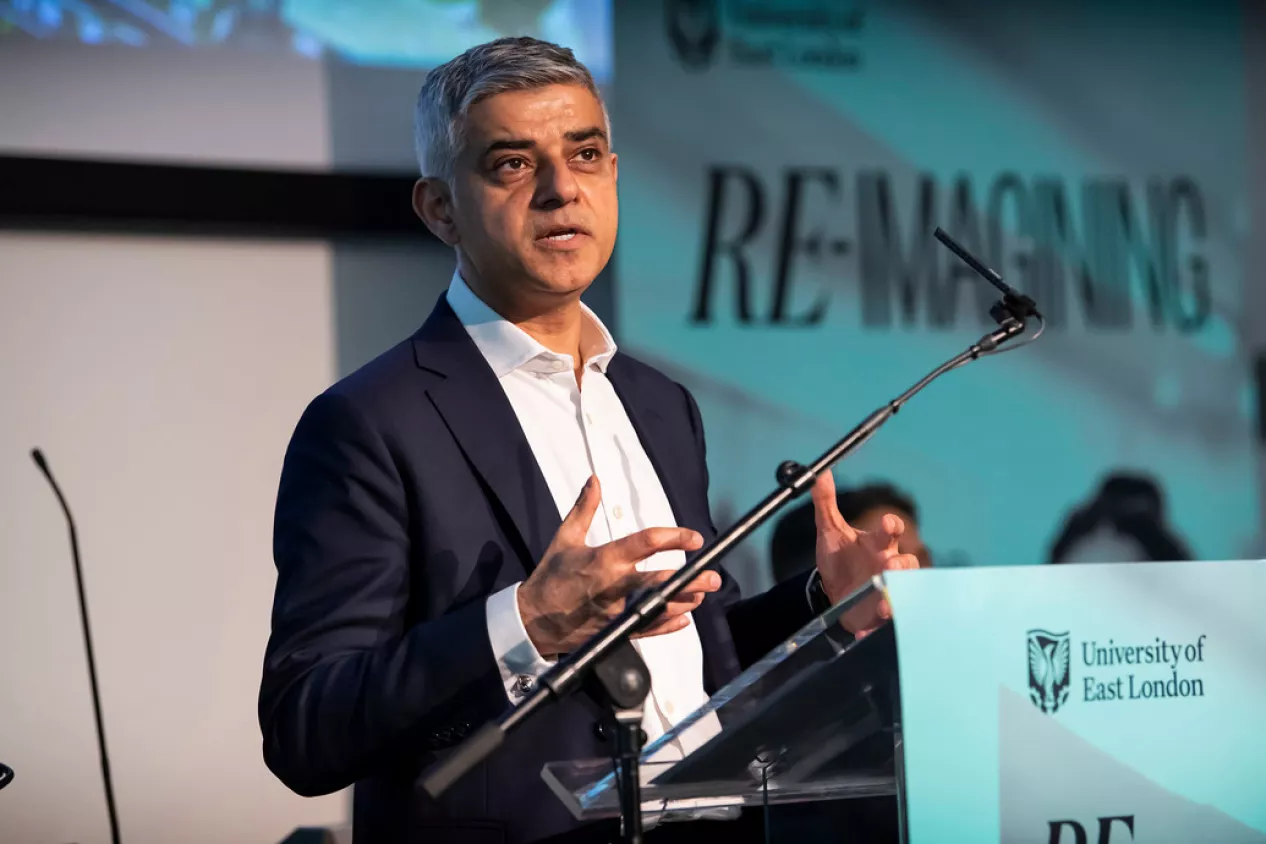A global blueprint for urban sustainability
Impact report - urban sustainability
Without our precious planet, we are lost. At UEL, researchers are rebuilding the way we think about how we protect our planet from the ground up. From the smallest bee-friendly garden or green roof to the largest computer networks and vast peatlands, the University sees sustainability as an essential responsibility, and has the research credentials to prove it.
Underpinning this groundbreaking research is an inspiring institutional promise: UEL is committed to be net zero carbon by 2030. This journey will change the way things are done across the whole University, and will not only lower emissions but improve the health and wellbeing of the UEL community, and provide a pathway for those with interests in green careers and sustainability research.
As ever, the University recognises the importance of partnership in tackling the world’s greatest challenges – and none more so than the climate crisis. In practical terms this means that bringing people together so that schools, services and stakeholders can work collaboratively, and looking beyond the physical boundaries of the University.
UEL’s partnership with Siemens detailed in this chapter offers solutions to the societal and environmental challenges that we face. Matching UEL’s global ambitions, this strategy will act as a blueprint for decarbonisation in urban higher education settings across the globe. Informed by real-time data and aided by innovative technologies, the University’s net zero strategy is truly pioneering.
The promise that UEL makes is to bring everyone with them on this journey to net zero: all staff will understand the commitments UEL is making to sustainability, and how their role is driving positive change for the university community and our environment; and all students will leave as responsible graduates and global citizens with the knowledge and skills to live sustainable lives after their time at university.
Foreword by Sadiq Khan, Mayor of London
Bold ideas and brave approaches are needed if the UK is to tackle the climate crisis and take full advantage of the huge opportunities afforded by the green economy.
As centres of innovation and expertise, universities are the obvious place to look for solutions for complex challenges. The University of East London (UEL) recognised that over 20 years ago by creating the UK’s first Sustainability Research Institute. Now, UEL is demonstrating how universities can unlock the power of collaboration to deliver the progress we need in the green revolution and race against the climate crisis.

A green and healthy world
In an era marked by rapid urbanisation and environmental challenges, UEL has emerged as a frontrunner in championing urban sustainability. Through partnerships both at home and internationally, UEL provides technical support to governments, develops sustainable materials and environments, creates innovative tools empowering poor and disadvantaged groups, informs policy making and expands critical capacity.
Working with UEL is very inspiring - they have a strong sustainability strategy, students who live the values of the university and a great leadership team embracing it. And this gives us a purpose and an energy that powers our work together.
Bjorn Burbach
Partner Digital Transformation
Learn more about UEL's research in our REF 2021 case study on protecting coastlines from climate change.
UEL 2030: The net zero campus challenge
UEL is committed to being a net zero carbon campus by 2030. This is both an immense challenge and an opportunity, which UEL has fully embraced as a role model for how higher education institutions can decarbonise and maximise the value of data – as well as understanding better how achieving net zero can be done in large urban centres like east London.
And it isn’t doing this alone. UEL has established a long-term partnership with industry leader Siemens in order to turbo-charge its mission to net zero. The partnership focuses on energy reduction and green energy production, on UEL campuses, green business development and growth, establishing a diverse talent pipeline for the green economy, and creating a Living Lab of green data for research and innovation. The partnership earned the organisations a joint victory at The Decentralised Energy Awards 2023, where they were recognised as the Net Zero Leader.

UEL is one of the most ambitious universities in the country. They have a clear vision of how they can reshape education for the benefit of all - giving students from any background the skills and opportunities they need to thrive in the modern world.
Simon Burgess
Renewable Energy Project Developer
Case studies
UEL and Siemens Living Lab
As part of their wider partnership, UEL and Siemens launched the Living Lab project in 2023, aiming to create a smart and sustainable environment to test green innovation. The Living Lab will offer UEL students, staff and researchers access to campus energy data, which they can use to understand UEL’s energy usage and simulate changes. It will also provide space for students and staff to research and adapt technology in a real-world living test bed.
Both Siemens and the University of East London believe that community collaboration is essential to stimulating the local area’s green economy. The development of a Living Lab will allow students and researchers to use real data from the campus environment to enhance learning, teaching, and collaborative research, as well as investigating ways to introduce local-scale projects and encouraging the community to campus to learn about the work in place.
The Lab will provide a space to develop and run hackathon initiatives and an internship program, all with the wider aim of supporting sustainable enterprise across campus.
Replacing concrete with sugarcane
Between 4-8% of global carbon emissions come from the production and use of concrete as a construction material.
UEL’s Sustainability Research Institute (SRI) has pioneered a way to turn biowaste from sugarcane into a sustainable alternative for concrete which is ultra-low carbon.
Working in collaboration with leading construction firm Grimshaw Architects and Docklands-based food manufacturer Tate & Lyle, the “SugarCrete Slab” can offer an alternative to concrete while demonstrating environmental benefits.
The system reduces curing time to one week compared to standard concrete which takes up to 28 days. Sugarcrete is five times lighter than concrete, and generates substantially cheaper costs compared to concrete production.
The three partners are identifying where the ‘Sugarcrete slab’ prototype will now be tested in the sugar producing Global South countries with high numbers of sugar plantations, to reduce the environmental impact of transporting concrete and remove the need of mixing it by hand which can be structurally unreliable, even dangerous.
Sugarcrete was nominated for the prestigious 2023 Earthshot Prize, which is awarded to solutions that are innovating in the sustainability space.
Green tech: R&D for a sustainable future
The ARENA (Advancing Resource Efficiency and Urban Ecology Innovations) was a successful pan-London business support project led by UEL's SRI in partnership with Barking Riverside Limited, which operated from 2019 to 2023 with support from the London European Regional Development Fund programme. UEL as project lead provided research and development support to 44 London businesses, most of which were small-to-medium enterprises, focused on technological validation for 'green' product and service innovations in the emerging areas of nature-based solutions, urban green infrastructure, resource efficiency and the circular economy.
A recent independent evaluation of the project estimated that by 2030, every £1 of public funding invested in ARENA is expected to generate between £1.68 and £3.43 of gross value added.
Reducing energy consumption in data and tech
Achieving global net zero goals will require a reduction in energy intensive sectors - not just traditional heavy industry but in tech and data too.
Research at UEL has played a pivotal role in reducing data centre power consumption. Working in partnership with Techbuyer, UEL has developed the world’s first commercial tool to optimise energy efficiency in data centres. The tool has been used more than 100 times, saving 8.3 million WH in electricity and cutting 2,800 tonnes of CO2 emissions over a five-year period. The partnership was recognised with a Certificate of Excellence from Innovate UK.
The University is opening the Royal Docks Centre for Sustainability in December 2023, a regional hub for innovation and enterprise with data centres as a core element, leading to the creation of green jobs and sustainable businesses in east London.
Read more about UEL's research into energy efficiency in our REF 2021 case study on data centre energy usage.

Download the full report
UEL Impact Report
pdf, 14.16 MB
